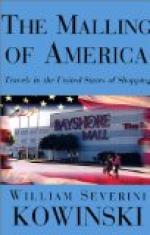Federal coinage not approved of by the people—the new scheme contrasted with the old one—advantages of an even division by the decimal
Delaware shad fishery—stupidity of the Anglo-Americans in giving English names to animals peculiar to the new continent—length of the siens— greatest haul of shad on record—fanatical law of the Quakers injurious to the fishery—sturgeon—extract from general Lincoln on the migration of fishes
Journey to Baltimore—water-stage—Newcastle—Glasgow—the Elk—bay of Chesapeake—arrival at Baltimore—yellow fever
Baltimore—situation—disadvantages of—the Dutch plan of canals not adapted to a southern latitude—the former race-course in the centre of the town—anecdote
MANUFACTORIES—not the interest of the Americans to engage in them—why— American iron—its malleability—two patents granted by Congress— sawing-mills—ship-building
Shooting and fishing—partridges—no game laws—woodcocks in August—the American ortolan—back woodsmen—their game—wild turkey—squirrel shooting—American fishing parties—how conducted
Indians—genius for oratory, painting, and sculpture—their continence— extract—the Indian student—the splenetic Indian—his remedy—seen in another point of view—the Indian orator—verses on an Indian burial-ground
SCHEME OF A RIFLE CORPS—of forming the corps—rifles—powder— accoutrements and dress—exercise
Speculation—the United States—the land of—100 acres of land for a dollar—flour—the mines—description of a coal-bank
Climate—Cooper on this subject not to be depended upon—quotation from Jefferson—the N.W. wind not accounted for—Volney—his intended investigation
White slave trade—mortality on board a white Guineaman from Ireland— Hibernian and German societies—the trade not allowed in New England—a German flesh-butcher sells his countrymen at Philadelphia during the fatal yellow fever of 1793
Journey to Boston—Pennsylvania the garden of the United States— Bristol—Trentown—New Brunswick—New York—arrival in Yankee Land—land speculators harangue—interrupted—arrival at Boston—P.S.—dramatic mania—detestation of the primitive Bostonians to theatricals—are first introduced as moral lectures—the theatrical opposition
Battle of bunker’s hill—inscription from a monument on the scene of action—anecdotes of Cox, the celebrated bridge-architect—connects Boston with the Continent—goes to Ireland, where he builds seven bridges
Boston—situation—West Boston—advantages of the harbour—the long wharf—new theatre—university of Cambridge—new bridge a mile in length— Irish market




